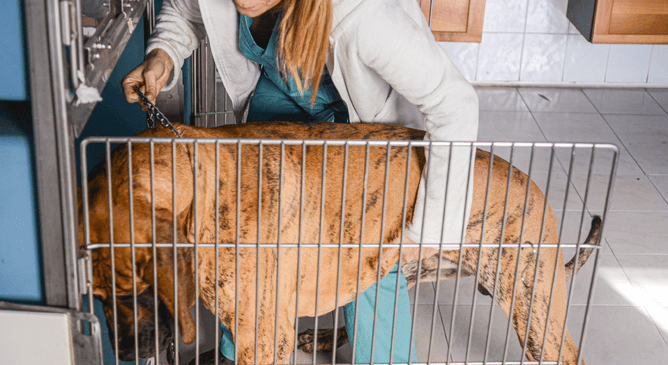Did you know that you can do something for your dog to prevent a life-threatening condition you may not even realise he or she could be at risk of?
Bloat is something that gets most people's attention, especially those who associate with large animals, like horses and cattle. Bloat is serious in any animal, but in the small animal clinic, when a pet arrives suffering bloat, it’s a big red flag!
Respiratory distress, a distended (swollen) abdomen, retching and trying to vomit, excessive drooling, restlessness or collapse are a combination of symptoms that are a strong indication of a condition called gastric dilatation-volvulus. Often shortened to GDV, and sometimes known as gastric torsion, this rapidly progressive and life-threatening condition causes extreme pain, shock and death within hours if not treated quickly. This is an emergency situation.
GDV can be separated into two movements. The first part is the GD – gastric dilatation, which refers to a condition in which the stomach becomes engorged with air and fluid (bloated), with the stomach swelling to many times its normal size. If the stomach continues to expand, it may reach a point where the food, fluid and gas inside cannot escape into the rest of the intestinal tract. The increased size and pressure of the stomach may lead to severe life-threatening consequences such as loss of blood flow to the stomach wall, rupture of the stomach wall, pressure on the diaphragm which will prevent the lungs from adequately expanding and prevention of blood flow returning to the heart, leading to cardiovascular compromise.
The second part, the V – volvulus, is when the bloated stomach rotates on its axis, preventing the contents of the stomach from escaping into the rest of the intestinal tract. The rotation can lead to a blockage in the blood supply to the spleen and stomach. At this point, the dog will be in severe shock and if not treated immediately, will likely perish.
The exact causes of GDV are not 100% known. However, statistically, we know that large, deep-chested breeds, such as Great Danes, German Shepherds, Weimaraners, Irish Setters, and more, including mixed breeds, are more prone to GDV. Ingesting large meals and large amounts of water can also be a contributing factor. Stress and also if GDV has occurred within the same bloodline (parents or grandparents) may put a dog higher at risk.
The only treatment for a GDV is emergency surgery. An exploratory laparotomy must be performed and the stomach recorrected to its normal position. Once this has been done, the stomach is sutured to the abdominal wall (gastropexy) to prevent another rotation. The recovery for the animal is intensive and long.
If your dog is deep-chested, a farm dog (GDV is the highest non-trauma condition to affect farm dogs) or has had a parent or grandparent suffer from GDV, there is a preventative measure you can take. A prophylactic gastropexy is a surgical procedure, performed on a healthy animal, where the stomach is sutured to the abdominal wall as a preventative measure against GDV. It is an elective surgery and is often done when the dog is being desexed.

